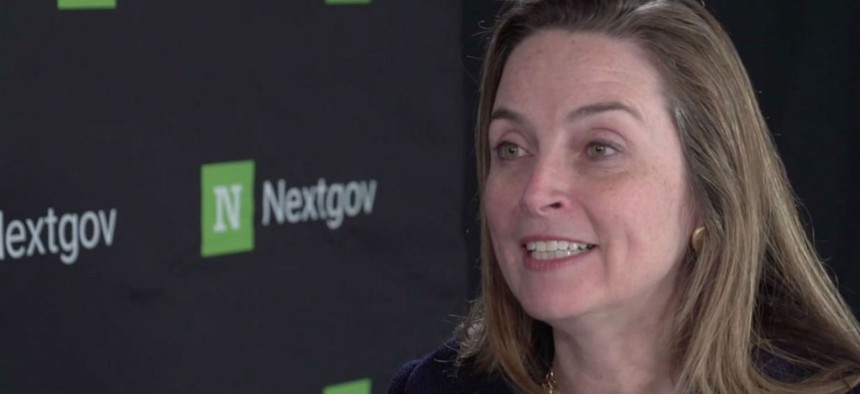
OMB's Margaret Weichert says the White House is focused on executing the president's management agenda. Nextgov
Why the President’s Management Agenda Is Different From Previous Plans
A former federal executive and veteran of previous reform initiatives believes the current agenda has staying power.
Many Americans have long held that their government can and should operate more smartly and responsively at less cost. With this in mind, administrations of both political parties in recent decades have rolled out a flurry of government reform plans.
I’ve helped plan and execute many of these reform plans over my 40-plus year career, either as a federal government executive or private sector management consultant. Some, though not all, of these initiatives have produced tangible improvements in government operations that continue today. But I believe the most recent of these reform initiatives—President Trump’s management agenda and its corresponding cross-agency priority goals unveiled last month—has greater potential to offer lasting and dramatic positive change. On paper, the management agenda is a very well-thought-out and ambitious government reform effort. But its execution will ultimately determine its legacy.
I don’t view this (or previous reform efforts) through a political lens. I served in every administration from Lyndon Johnson to Barack Obama and have worked on both Democratic and Republican reform initiatives. I firmly believe the drive to improve government efficiency, effectiveness and citizen responsiveness should and does hold wide bipartisan appeal.
The reasons I think this latest initiative holds more promise than previous reform efforts are because:
It is focused on execution. The management agenda’s 14 broad-based cross-agency priority goals are not novel. They echo familiar goals, such as getting payments right, applying results-oriented accountability for grants, sharing back-office services, transitioning to procurements that are managed by category across agencies, and reducing repetitive or obsolete administrative tasks and reporting requirements, among others. As Office of Management and Budget Deputy Director for Management Margaret Weichert said at its unveiling in Kansas City, “We’re not inventing something wholly new. But what we are doing is focusing on getting 'er done, we’re focusing on execution.”
The management agenda places high emphasis on the role that data, accountability, and transparency will place in driving results. Each of the 14 CAP Goals, which target areas where multiple agencies must collaborate to effect change, have quarterly objectives, and progress will be reported for all to see. Leaders and teams responsible for achieving those objectives are identified by name. For each CAP goal, the management agenda outlines implementing strategies to achieve the stated objectives, defines what success will look like, and even defines key performance indicators that will help gauge success.
It takes the long view. The agenda embraces the notion that a vision for government modernization should be multi-generational and that focusing on short-term fixes alone could fall short of what is needed. Meaningful transformation takes time and any modernization plan should consider factoring in both long- and short-term goals and allow for adjustments along the way.
It retains and aims to improve upon past approaches that work. The agenda doubles down on the goal-focused, data-informed management approaches of the last administration. It also continues a central reliance upon CAP goals—a valuable concept for dealing with the complex, multi-dimensional challenges that the government and the nation confront.
It is supported by interlocking and foundational policies and tools. The management agenda does not exist in isolation. For example, the administration is establishing centers of excellence that will assist agencies with tools and best practices to advance their competence in critical practice areas, such as cloud adoption, customer experience, IT infrastructure optimization, contact centers, and service delivery analytics. Attaining fluency and competency in these areas over the long term will be critical for agencies as they modernize their operations in pursuit of the plan’s objectives.
Similarly, the new Modernizing Government Technology Act provides agencies an important mechanism with which to finance many of the IT modernization components that will be so critical to accomplishing the administration’s goals.
Also, the president’s proposed fiscal 2018 and fiscal 2019 budget submissions articulate compelling business cases for agencies to build upon past reform initiatives by developing robust technology and data infrastructures and organizational cultures centered around evidence- and evaluation-based decision-making, continuous improvement, and improved customer experience. These budget proposals encourage agencies to create “portfolios of evidence”—in essence, a range of evidence types and analytical and management tools—to learn what works, what does not, under what circumstances, and how to improve results. They promote “learning agendas” in which agencies collaboratively identify critical questions that, when answered, help programs to be more effective. And they encourage agencies to integrate their mission-focused communities with data science communities to create “evidence infrastructures" that can deliver a better understanding of program effectiveness. These will be important enabling endeavors for agencies as they execute the management agenda’s goals.
Finally, the agenda sets in motion a number of modernization efforts that dovetail well with parallel efforts underway to reconsider agency organizations, structures, and mission overlap, as called for in Executive Order 13781. These efforts, if executed well, could position agencies to be far more agile, resilient, technically savvy, and effective in addressing a future that is likely to be considerably more dynamic and complex.
Dave Mader is chief strategy officer for the civilian federal government practice at Deloitte Consulting LLP. He formerly served as Office of Management and Budget controller and assistant deputy commissioner at the IRS.
NEXT STORY: Why No One Answers Their Phone Anymore






